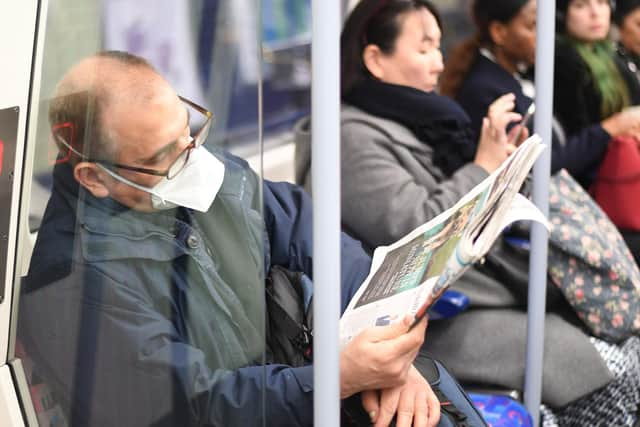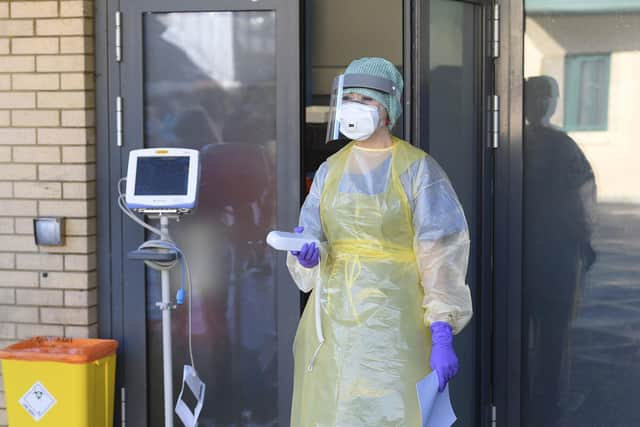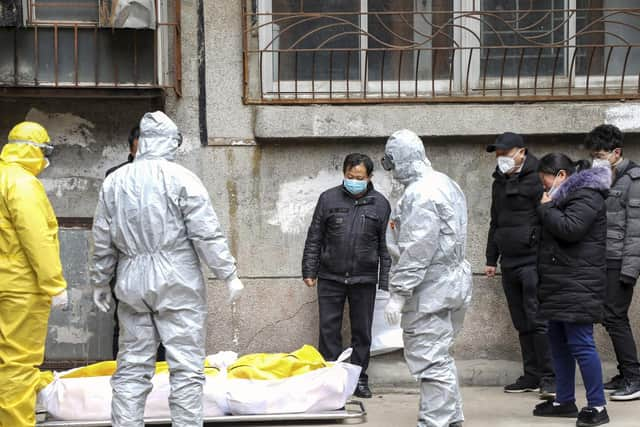'The UK is preparing for the worst' - FTSE down 8 per cent on back of oil war
Following its opening at 8am, the FTSE 100 leading index of London-listed businesses collapsed by more than 8%, wiping off more than 500 points.
Oil also saw its fastest single-day fall since the first Gulf War.
Advertisement
Hide AdAdvertisement
Hide AdBy 8.30am the FTSE 100 was down 8.6%, down 558 points at 5903.34, to a four-year low, hitting levels not seen since the Brexit referendum result in 2016.


Morrisons was down by 4.5 per cent while Persimmon was down 7.4 per cent.
Neil Wilson, chief market analyst at Markets.com, said: "This will be remembered as Black Monday. If you thought it couldn't get any worse than the last fortnight, think again. The blood really is running in the streets, it's utter carnage out there.
"The oil price shock has totally unnerved investors, while Italy's decision to quarantine 16 million citizens in the north of the country has left markets feeling like the coronavirus outbreak is out of control - where next? The UK is preparing for the worst."
Advertisement
Hide AdAdvertisement
Hide AdTraders, who are already fearful of an economic slowdown due to the coronavirus outbreak, piled out after the Saudis said they would ramp up production and cut prices.


Overnight a barrel of Brent Crude oil fell 30%, settling down 25.8% at 33.60 dollars per barrel as European markets opened.
With oil priced in dollars, the pound benefited, rising by 0.7% to 1.316 dollars.
In London, shares in Royal Dutch Shell led the collapse, with the price down 22% within 30 minutes of markets opening. BP also fell 19.6%, with shares down 79p at 316p.
Advertisement
Hide AdAdvertisement
Hide AdAround 15 of the top 100 companies lost more than 10% of their value within the opening 30 minutes of trading.


The move comes as the Saudis said they would raise production, even if it means taking a hit, as it battles with Russia over how much oil should be produced during the coronavirus outbreak.
There had been demand for oil supplies to be cut, to help shore up the price. But Russia indicated it would be willing to "turn on the taps", leading to the Kingdom to fight back with a promise of cheaper oil.
Global share markets plunged on Monday as panicked investors fled to the safety of bonds and the yen to hedge the economic trauma of the coronavirus.
Advertisement
Hide AdAdvertisement
Hide AdOil plunged more than 30 per cent after Saudi Arabia opened the taps in a price war with Russia.
Saudi Arabia had stunned markets with plans to raise its production significantly after the collapse of OPEC’s supply cut agreement with Russia, a grab for market share reminiscent of a drive in 2014 that sent prices down by about two thirds.
The shock in oil was seismic as Brent crude futures slid $12 to $33.20 a barrel in chaotic trade, while U.S. crude shed $11.80 to $29.48.
In Asia, stocks tumbled, the safe-haven yen surged and emerging market currencies with exposure to oil tumbled in volatile trade.
Advertisement
Hide AdAdvertisement
Hide AdHeavy selling was set to continue, with European futures sharply lower and U.S. futures hitting their down limit.
Markets in chaos as oil prices plunge, coronavirus spreads
Investors drove 30-year U.S. bond yields beneath 1% on bets the Federal Reserve would be forced to cut interest rates by at least 75 basis points at its March 18 meeting, despite only just having delivered an emergency easing.
“Wild is an understatement,” said Chris Brankin, Chief Executive at stockbroker TD Ameritrade Singapore.
“Not just us, but across the globe you would have every broker/dealer raising their margin requirements...trying to basically protect our clients from trying to leverage too much risk or guess where the bottom is.”
Advertisement
Hide AdAdvertisement
Hide AdMSCI's broadest index of Asia-Pacific shares outside Japan .MIAPJ0000PUS lost 4.4% in its worst day since August 2015, while Shanghai blue chips .CSI300 fell 2.9%.
EuroSTOXX 50 futures STXEc1 last traded down 6%, German DAX futures FDXc1 dropped 5.6% and FTSE futures FFIc1 fell 6.5%.
Japan's Nikkei .N225 dropped 5.1% and Australia's commodity-heavy market closed down 7.3%, it's biggest daily fall since the 2008 global financial crisis.
E-mini futures for the S&P 500 .SPX hit their lower limit of 2,819 in Asia morning trade, pointing to Wall Street's rout deepening as investors priced in growing risks of a U.S. recession.
Advertisement
Hide AdAdvertisement
Hide AdThe number of people infected with the coronavirus topped 107,000 across the world as the outbreak reached more countries and caused more economic carnage.
Italy’s markets are sure to come under fire after the government ordered a lockdown of large parts of the north of the country, including the financial capital Milan.
There were also worries that U.S. oil producers that had issued a lot of debt would be made uneconomic by the price drop.
Not helping the mood was news North Korea had fired three projectiles off its eastern coast on Monday.
Advertisement
Hide AdAdvertisement
Hide Ad“After a week when the stockpiling of bonds, credit protection and toilet paper became a thing, let’s hope we start to see some more clarity on the reaction,” said Martin Whetton, head of bond & rates strategy at CBA.
“Dollar bloc central banks cut policy rates by 125 basis points, not as a way to stop a viral pandemic, but to stem a fear pandemic,” he added, while noting many had little scope to ease further.
A tectonic shift saw markets fully price in an easing of 75 basis points from the Fed on March 18, while a cut to near zero was now seen as likely by April.
The European Central Bank meets on Thursday and will be under intense pressure to act, but rates there are already deeply negative.
Advertisement
Hide AdAdvertisement
Hide Ad“The onus is falling, perhaps inevitably on the actions of governments to abandon budget surpluses and reinvigorate the demand side of the economy,” said Whetton.
Urgent action was clearly needed with data suggesting the global economy toppled into recession this quarter. Figures out from China over the weekend showed exports fell 17.2% in January-February, from a year earlier.
Analysts at BofA Global Research estimated the latest sell-off had seen $9 trillion in global equity value vaporised in nine days, while the average 10-year yield in the developed world hit 16 basis points, the lowest in 120 years.
“The clearest outcome of the exogenous COVID-19 shock is a collapse in bond yields, which once panic fades can induce huge rotation to ‘growth stocks’ and ‘bond proxies’ in equities,” they wrote in a client note.
Advertisement
Hide AdAdvertisement
Hide AdThe yield on 10-year U.S. Treasuries last sat at 0.4900%, after having plunged to a once-unthinkable 0.4690%, having halved in just three sessions.
Yields on the 30-year long bond dived 35 basis points on Friday alone, the largest daily drop since the 1987 crash, and slid under 1% on Monday to reach 0.96%.
The fall in yields and Fed rate expectations has pulled the rug out from under the dollar, sending it crashing to the largest weekly loss in four years.
The dollar extended its slide in Asia to as far as 101.60 yen JPY=, depths not seen since late 2016. It was last down 2.4% at 102.80 in wild trade.
Advertisement
Hide AdAdvertisement
Hide AdThe euro likewise shot to the highest in over 13 months at $1.1492 EUR=, to be last at $1.1406.
Gold initially cleared $1,700 per ounce XAU= to a fresh seven-year peak, only to fall back to $1,669.93 amid talk some investors were having to sell to raise cash to cover margin calls in stocks.
Comment Guidelines
National World encourages reader discussion on our stories. User feedback, insights and back-and-forth exchanges add a rich layer of context to reporting. Please review our Community Guidelines before commenting.